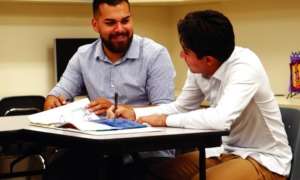The dropout problem is getting a lot of attention lately, and last month brought a new sign of its growing stature as a national issue: It was the subject of a Washington news conference featuring a granola and strawberry breakfast spread, retired Gen. Colin Powell and television news cameras.
The event at Union Station, a few blocks from the Capitol, was sponsored by the America’s Promise Alliance to unveil its new Dropout Prevention campaign, which aims to set up dropout summits (100 of them) in every state. To draw the media, America’s Promise released a dropout study and filled the stage with some big names, including Alma Powell (its board chairwoman and wife of Colin Powell, the founding chair), U.S. Education Secretary Margaret Spellings, National Urban League President Marc Morial and a couple of U.S. senators.
To garner real national attention – in this year’s presidential campaign, for instance – the dropout prevention movement is reaching beyond drawing sympathy for the plight of individual young people, and painting the dropout phenomenon as a threat to the public’s safety and wallets. Using data from the study – for example, that only about half of youths served by the “main school systems” in the nation’s largest cities graduate from high school – the speakers said the dropout problem threatens national security and the economy.
Colin Powell noted that the military needs educated and skilled leaders. Morial warned of an “economic tsunami,” saying, “We cannot compete in this changing global marketplace if we leave these young people behind.”
(For more on the report, “Cities in Crisis,” see Report Roundup, May 2008.)
No one from the field of youth work was among the unusually large number of speakers at the news conference (10) or in the subsequent panel discussion (six). Researchers, education experts and elected officials dominated.
They were, after all, talking about dropping out of school. Still, one had to wonder what role non-school youth development agencies might play in what America’s Promise hopes to turn into a signature campaign. The plan is to hold at least one summit in each state, plus summits in 50 more communities, over two years.
“We’ll not just be meeting to talk about the problem,” Alma Powell pledged. The goal is “to build a specific action plan” in the communities.
As for the youth agency role – raised by Youth Today during the three-question Q-and-A., with the other two questions coming from the invited audience – she said, “People who work with youth-serving organizations … are in the very best position” to help prevent dropping out. “Youth-serving organizations are a major part of this.”
“All of the communities and youth-serving organizations have a role to play, and it is just as important as the schools,” Colin Powell added. He noted that the effort will require contributions not only from educators, but from mentors and other types of youth workers.
The audience of 100-plus did feature several people from key organizations in youth work, including Youth Service America, the Forum for Youth Investment, the National Foundation for Teaching Entrepreneurship and Casey Family Programs. The youth speaker at the news conference, former high school dropout Kareema Conda-Barr, is an alumna of YouthBuild.
The campaign is backed by, among others, the Bill and Melinda Gates Foundation, Casey Family Programs and State Farm Insurance (the lead sponsor).
For more on youth agencies preventing dropouts, see Jane Quinn, May 2008.
Contact: America’s Promise (202) 657-0600, http://www.americaspromise.org.






























